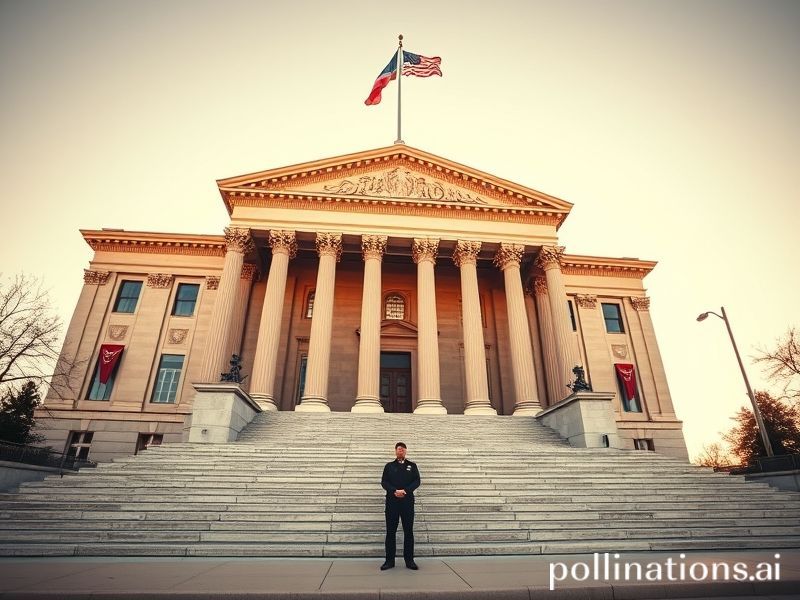Oklahoma’s Supreme Court Guts Ballot Rights—The World Takes Notes on How to Kill Democracy Quietly
The Oklahoma Supreme Court Rides Again—This Time Without a Global Posse
By Our Man in the Cheap Seats, Still Recovering from the Last Judicial Rodeo
OKLAHOMA CITY—While the rest of the planet was busy arguing over submarine deals, algorithmic revolutions, and whether the Arctic will finish melting before your next mortgage payment, the Supreme Court of Oklahoma quietly handed down a ruling that, on paper, affects only the 3.9 million souls who insist on calling this land “home.” Yet scratch the prairie dust off the opinion and you’ll find a case study in how American state courts—those charming, underfunded courthouses that look like abandoned Dollar Generals—still manage to ricochet around the globe like a drunk cowboy at last call.
The immediate issue was delightfully provincial: Does the state constitution grant residents a fundamental right to gather signatures and put questions directly on the ballot, or can the legislature slap on bureaucratic duct tape until the petition process resembles a TSA line at Christmas? In a 5-4 decision, the court sided with the duct-tape lobby, effectively kneecapping a grassroots push to expand Medicaid—an initiative that would have brought billions of federal dollars into a state whose official sport appears to be refusing federal dollars on ideological grounds.
Cue international bewilderment. In Berlin, a policy-wonk sipping espresso spat out the word “Oklahoma?” as if it were a typo for “Ukraine.” In Lagos, a civil-society lawyer WhatsApped: “So they can vote on American Idol but not on chemotherapy?” And in Beijing, state media barely suppressed a smirk while reporting that U.S. “democracy” can’t even manage a referendum without judicial intervention—conveniently forgetting that China’s own petition system is basically a suggestion box nailed to a wall in the Forbidden City.
The global significance lies not in the Medicaid expansion itself—Oklahoma’s uninsured rate could hit 200 percent and the Shanghai stock market would still obsess over property-sector debt—but in the meta-narrative: a laboratory demonstration of how democratic mechanisms are quietly eroded by the very people who campaign on “freedom.” It’s a recipe being test-marketed in the American heartland before export, like deep-fried butter at a state fair that somehow ends up on menus in Dubai.
Consider the toolkit: raise signature thresholds, shrink deadlines, require notarization in triplicate, and—if all else fails—let the court declare the petition “unconstitutional” because it contains a semicolon where the framers allegedly preferred an em dash. Voilà: direct democracy becomes indirect bureaucracy, and all without the unseemly optics of tanks in the street. From Budapest to Bangalore, would-be autocrats are taking notes that fit neatly into a single PowerPoint slide titled “How to Kill a Referendum While Pretending to Honor It.”
Meanwhile, the international human-rights industry—those tireless NGOs with donor-fatigue hangovers—issued press releases lamenting “the shrinking civic space in Oklahoma.” Yes, you read that correctly: the same phrase once reserved for Khartoum is now applied to a state whose name translates from Choctaw as “red people” and whose tourism slogan is, hilariously, “Imagine That.” If satire were ozone, we’d all need SPF 5000 by now.
Back inside the marble courthouse—imported Italian stone, because nothing says “fiscal conservatism” like outsourcing geology—the majority opinion insisted the ruling protects the legislature’s “coequal” status. Translation: we prefer our voters like our oil, safely underground. The dissent countered with a scathing ode to popular sovereignty, which in Oklahoma is less a concept than a nostalgic brand, like Route 66 or depression-era cattle auctions.
What happens next? Medicaid expansion advocates will return to Plan B: begging the same lawmakers who just kneecapped them, a strategy akin to asking the bartender for a refund after he’s drunk your rent money. Nationally, the decision hands Congress another Exhibit A for why federal legislation is “necessary,” which in Washington-speak means “dead on arrival.” Globally, the episode reinforces the planet’s favorite stereotype: America is a place where you can buy an AR-15 at Walmart but need a notary, two witnesses, and a lunar eclipse to expand health coverage.
And so the Oklahoma Supreme Court rides into the sunset, robes flapping like flags made of denial, leaving the rest of us to ponder a world where democratic norms are dismantled not by coup but by comma. Somewhere, a seminar room in Moscow is applauding. Somewhere else, a Lagosian activist is updating her slide deck. And somewhere in Oklahoma, an uninsured diabetic is still waiting—proof that while justice may be blind, it’s also remarkably adept at dodging bullets it fired itself.







